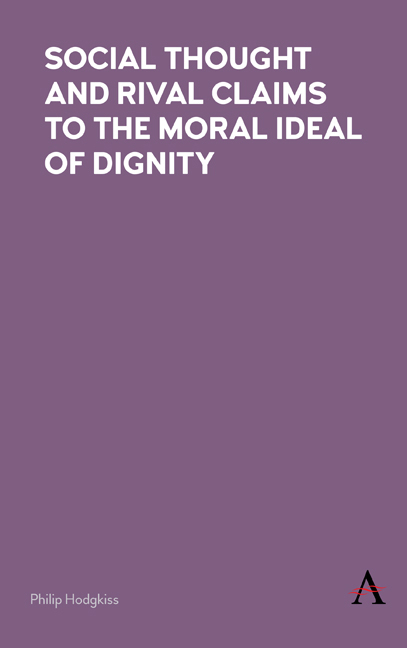Book contents
- Frontmatter
- Contents
- Preface and Note on Text Structure
- Acknowledgements
- Chapter One Introduction: The Distinction of Dignity
- Chapter Two Dignity, Freedom and Reason: From Ancient Greece to Early Modernity
- Chapter Three The Sense of Dignity in Moral Philosophy: From the Ethical Intuitionists to the Irrationalists
- Chapter Four Marx's Critique of Morality: Natural Law, the State and Citizenship
- Chapter Five Classical Sociology's Regard for Human Dignity
- Chapter Six The Human Face of Dignity Reflected in Phenomenology and Existentialism
- Chapter Seven A Fresh Term for Dignity: Attending the Frankfurt School (Both ‘Old’ and ‘Young’)
- Chapter Eight Notes Sampling Research and Practice: Making Dignity Work; Making Dignity Care
- Chapter Nine The Slighting of Dignity: The Critic's Charter
- Chapter Ten Conclusion: After the Recognition of Dignity
- Notes
- Bibliography
- Index
Chapter Five - Classical Sociology's Regard for Human Dignity
Published online by Cambridge University Press: 21 June 2018
- Frontmatter
- Contents
- Preface and Note on Text Structure
- Acknowledgements
- Chapter One Introduction: The Distinction of Dignity
- Chapter Two Dignity, Freedom and Reason: From Ancient Greece to Early Modernity
- Chapter Three The Sense of Dignity in Moral Philosophy: From the Ethical Intuitionists to the Irrationalists
- Chapter Four Marx's Critique of Morality: Natural Law, the State and Citizenship
- Chapter Five Classical Sociology's Regard for Human Dignity
- Chapter Six The Human Face of Dignity Reflected in Phenomenology and Existentialism
- Chapter Seven A Fresh Term for Dignity: Attending the Frankfurt School (Both ‘Old’ and ‘Young’)
- Chapter Eight Notes Sampling Research and Practice: Making Dignity Work; Making Dignity Care
- Chapter Nine The Slighting of Dignity: The Critic's Charter
- Chapter Ten Conclusion: After the Recognition of Dignity
- Notes
- Bibliography
- Index
Summary
We have a cult of personal dignity which, as with every strong cult, already has its superstitions. It is, thus, we may say, a common faith but it is possible only by the ruin of all others and, consequently, cannot produce the same effects as this mass of extinguished beliefs. There is no compensation for these. (Durkheim 1972, 146)
In the Realm of Morality: The Classical Sociological Interpretation of Dignity
Unlike modern sociology, which, when it comes to the questions of morality and ethics as substantive issues, often appears to defer to philosophy, classical sociology regarded the metaphysical and existential dimensions of morality and ethics as a natural part of their brief. They were as much an essential component of the intellectual project of the founders of sociology as was their concern with, say, power and conflict, class inequality and more general problems of industrial society. While these founders were the trailblazers in this new field of sociology, their only real reference points were the likes of Kant, Hegel and Nietzsche. Most often, their immediate recourse was to Kant (1964, 1991), and Kantianism (of the order discussed previously) makes its presence felt immediately in classical sociology. Nevertheless, by producing a much more robust model of the social world than Kant had been able to adduce, this first generation of sociologists transcended the Kantian legacy. By examining the work of Marx, and now, Durkheim, Weber and Simmel, we can detect that each, in their own distinctive way, saw the modern human subject as having become the repository of dignity: ‘All thought the modern order had much to offer mankind; that it was bound up with the effort towards progress and justice; but all saw, also, that it contained great threats to the very qualities of human dignity which lay at the heart of this promise’ (Fletcher 1971, 455). They had all identified a moral malaise that required an ethical solution. Auguste Comte in the first half of the nineteenth century had set the agenda for them, for it was him who had used the terms nobility and dignity to capture a quality of social relation, judged by him as having relative strength or energy and, in the case of dignity, a pervasive quality. He envisaged the ascendency of altruism over egotism, with egotism (the naturally stronger) succumbing to altruism (the naturally weaker).
- Type
- Chapter
- Information
- Publisher: Anthem PressPrint publication year: 2018



